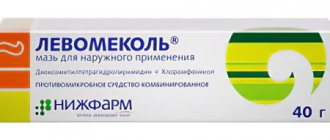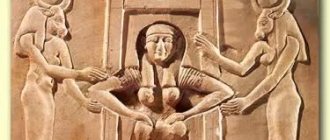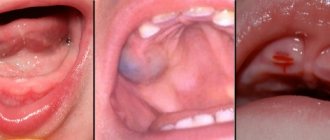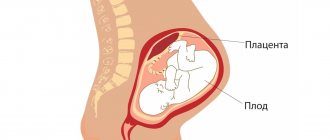How to understand that the process has begun
It is very important to know the periods when small babies begin to teethe. This will help you choose the right medications if necessary. Typically, symptoms begin to appear as early as three months. However, this does not mean that the first tooth will appear soon.
Some children don't develop teeth until they are one year old. However, the process of teething itself is unpleasant and causes a lot of trouble. This is why it is so important for parents to be able to identify symptoms. Otherwise, the baby will bother you with crying and screaming all night, and the parents will not be able to sleep.
So what do you need to pay attention to?
- The first sign that indicates teething is the baby’s mood. If before this the child behaved calmly, was quiet, balanced, and then became loud and irritable, it is worth paying more attention to the child and providing him with help.
- The baby may have trouble sleeping at night and even refuse to eat.
- You need to find out the condition of your gums. Usually, when they erupt, they are red and slightly swollen.
The process of teething is painful and unpleasant, so the baby will try to relieve the pain with all his might. Babies put small things into their mouths, trying to chew them.
Teething symptoms
Signs of teething vary and depend on the individual characteristics of the baby . But we can identify a number of common, most common symptoms:
- Redness and swelling of the gums.
- Increased salivation.
- Desire to chew on any objects.
- Loss of appetite.
- Restless sleep.
- Deterioration of general condition.
- Just before teeth appear, a white stripe appears on the gums.
- Temperature increase.
Possible accompanying symptoms include diarrhea, wet cough, runny nose.
An increase in temperature is promoted by biologically active substances that begin to be released during teething. An increase in temperature during this period to 37–38.5 degrees is considered normal.
How to reduce discomfort
Special products that can be purchased at a pharmacy help relieve pain. Sometimes folk remedies help, but they are not always able to relieve pain. At the same time, some drugs can cause allergies in the baby, then this will definitely not help the situation.
You can do without medications, but the effect will not last long. Since salivation increases in children during teething, you can give the child cold water. This will help relieve pain. Gum massage helps effectively.
You can do it yourself, but it is better not to press too hard on the gums. It is advisable to additionally use clean gauze, then the effect will be enhanced. There are special teething toys that improve the condition of gums and teeth.
How to help a child?
All means that can be used to relieve pain and discomfort can be combined into three groups:
- “Home” and special teethers.
- Medicines in the form of gels, ointments, drops, suppositories.
- Folk remedies.
Until a teether has been purchased, a baby who does not yet have a single tooth can be offered a homemade option in the form of dried bread, crackers, apples, and carrots.
You can use your finger as a teether, massaging your gums with it from time to time. Teethers offered in stores and pharmacies can have different shapes , colors and materials. You can choose such a device from latex, rubber, silicone, plastic. Some of them have special openings for gels and ointments, with the help of which the anesthetic can get onto the child's gums without being noticed. The teether is selected individually. It all depends on the child's preferences.
You can use cold as a pain reliever, which will slightly soothe the pain and reduce swelling. You can use a cold spoon or cloth, a chilled teether, a frozen banana or a dryer.
Medicines
There are special medications and remedies that help alleviate the condition of teeth and gums in tiny children. They contain a very small amount of painkiller, which acts locally and helps improve the condition. Gel, ointment and other teething products lightly freeze the baby’s gums.
Apply the product with gentle massage movements to the site where the tooth is erupting. The drugs act very quickly, calm and relieve pain within a few minutes.
Baby gel for teething and painful gums can be of three types:
- anti-inflammatory;
- homeopathic with natural composition;
- cooling.
For infants, preparations with natural ingredients are usually chosen, since the composition of such a product is the safest for the baby. If you use the gel constantly, you may get used to it and then there will be no effect.
The best medicines
Below are some baby remedies that can help relieve teething pain and gum disease.
Kalgel
Reduces pain and prevents the development of the inflammatory process. Protects the gum mucosa from microbes. Already at five months the drug can be used. The gel has a quick effect, relieves pain and discomfort. Provides a reliable anti-inflammatory effect.
Gel Kalgel also has a number of disadvantages:
- It is available only by prescription, you cannot just buy it;
- an allergy may appear to it, which is unacceptable in young children;
- there are contraindications for use.
Dentinox
A remedy consisting of three actions. Helps relieve pain, relieve irritation, eliminate inflammation. The composition includes natural chamomile extract, which relieves the inflammatory process, as well as local anesthetics that relieve pain.
This gel is a very effective product, reviews confirm this. You can use this ointment before bedtime - the baby will sleep better.
Can be used from 4 months. Dentinox is also given to adults whose baby teeth are replaced by permanent ones. If children have high sensitivity to glucose, the drug should not be used. Dentinox may cause allergies, so it is best to consult a doctor before use. If children have gum damage, Dentinox should be discontinued.
Dentol baby
The gel can be used from early childhood. Even adults are allowed to use it. The gel can be applied up to 4 times a day. It cannot be used for more than a week. The product is affordable, low-toxic, does not irritate the gums, and is easy to apply.
But if children have damaged gums or inflammatory processes, there is no need to use Dentol Baby. May cause severe allergies.
Holisal
It is considered one of the best remedies for teething and painful gums. The drug is combined, therefore it provides three actions at once:
- pain reliever;
- antimicrobial;
- anti-inflammatory.
The gel not only alleviates the condition, but also reduces swelling, relieves inflammation, and removes tissue damage. The drug is well absorbed, which makes it very convenient to apply. However, children under 12 months of age should not be given the gel. Cholisal is expensive.
Important points
Specially developed drugs help relieve pain and inflammation, but they must be used correctly. It is better to first consult a pediatrician, since any gel or ointment can have side effects and also cause allergies. It is very dangerous for infants.
It is better to buy the drug with instructions. It should be read as there may be differences in the application of the product. Important attention should be paid to age. Some medications can only be used at 6 months of age.
Lidocaine-based products can only be used after meals, since the baby will then not be able to breastfeed for some time. Apply products only with clean hands or a sterile cotton swab. It is better to apply ointment or gel before bed.
What you need to know
There are several other signs that do not indicate teething. These include: high fever, cough, diarrhea, vomiting. If similar symptoms are noticed in your baby, you should immediately contact your pediatrician, as an infectious process may develop. E. coli, influenza and other viruses usually cause such phenomena. This may require medical attention.
Sometimes young children develop ulcers or pustules in their mouths. They also do not indicate teething in any way. This is usually how stomatitis manifests itself.
Bright red erosions, redness, swelling - all this indicates its manifestation. In this case, it is advised to call a pediatric dentist rather than a pediatrician, since the latter does not understand these issues. At such moments, it is important to provide the baby with all the necessary help. Gels, ointments and other products will help with this.
Problems encountered when using gels
The main problem that young parents face is that the gel stops working . At the same time, just recently the drug helped tremendously. Why did this happen? It's all about violating instructions. Parents knowingly or unknowingly exceeded single dosages, which led to addiction. The body reacts to the main active components of the gel. To get the desired effect, you need to increase the dosage even more, which can cause serious harm to the baby’s health.
It turns out that the gel has nothing to do with it. Parents themselves are to blame for the fact that the teething gel has stopped working. Of course, mothers can understand: it’s hard for them to see their baby suffer. But this does not mean that you can violate the instructions for using medications.
Another problem is the baby getting used to the gel . The point is that it is impossible to calm the baby down. Games, teethers, persuasion, etc. do not help. The child becomes dependent on the gel. He requires the drug even for the most insignificant discomfort.
This is a very dangerous situation and should be avoided. To do this, you need to observe the frequency of use of the gel and the dosage, and also not use the drug unless absolutely necessary.
If such a situation occurs, it is recommended to change the brand of gel.
An allergic reaction is the most serious problem that arises when using pain relieving gels. Sometimes it does not appear immediately, but only after several uses. In the latter case, allergies are caused by exceeding the dosage and increasing the frequency of use of the drug, causing sensitization of the body. As a result, the child’s immune system begins to react sharply to the pain-relieving components of the gel. To avoid this, gels should be purchased based on the doctor’s recommendations, and not on the reviews of friends and acquaintances.
Allergy to gels manifests itself in the form of various rashes. When it appears, it is recommended to change the drug.
Oral hygiene
Even a small baby needs to maintain proper oral hygiene. If you do not pay attention to this, stomatitis and other infectious diseases may develop. It is necessary to clean your gums twice a day. For this, fabric finger pads are sold, but you can also use a clean bandage or gauze.
Once teeth have already begun to emerge, more careful care is required. Here you will need gels and special children's pastes, as well as brushes.
Some diseases or abnormalities in the body can cause problems with teething. Usually, many reasons are associated with illnesses that the expectant mother suffered in the early trimesters of pregnancy.
These include:
- rubella, toxoplasmosis;
- stress;
- kidney diseases;
- pneumonia or a cold with a high fever;
- infections, herpes, and toxicosis.
In this situation, the doctor prescribes therapeutic measures. To analyze the situation, an x-ray is prescribed. It allows you to see the child’s dental system.
The most common problems of primary teeth
- gap between the upper incisors. Speaks of intensive jaw growth and a deeply located frenulum;
- changes in tooth color. This is caused by excessive consumption of tea drinks or the use of certain groups of antibacterial agents. It is also necessary to exclude hereditary liver and blood diseases;
- malocclusion. Associated with prolonged nipple sucking.
Baby teeth are the key to healthy permanent teeth. Follow all the recommendations on hygiene and nutrition, and a visit to the dentist will not be an ordeal.










